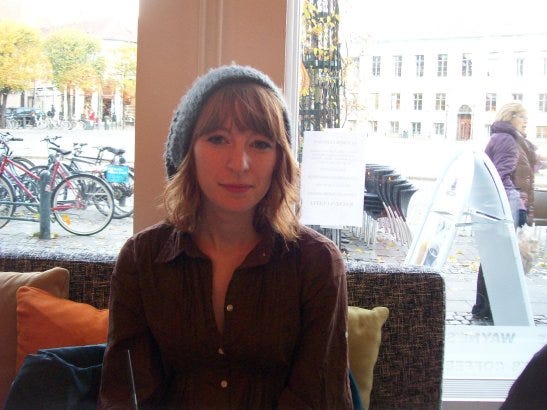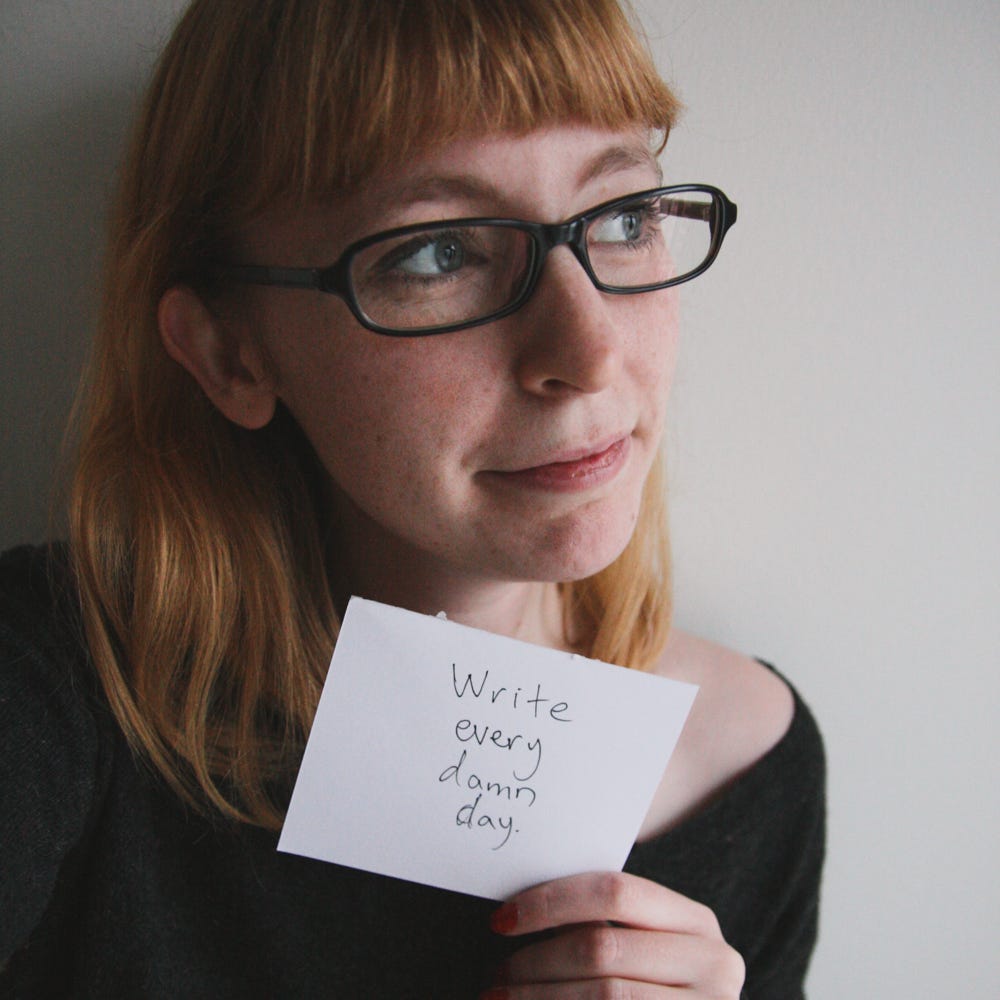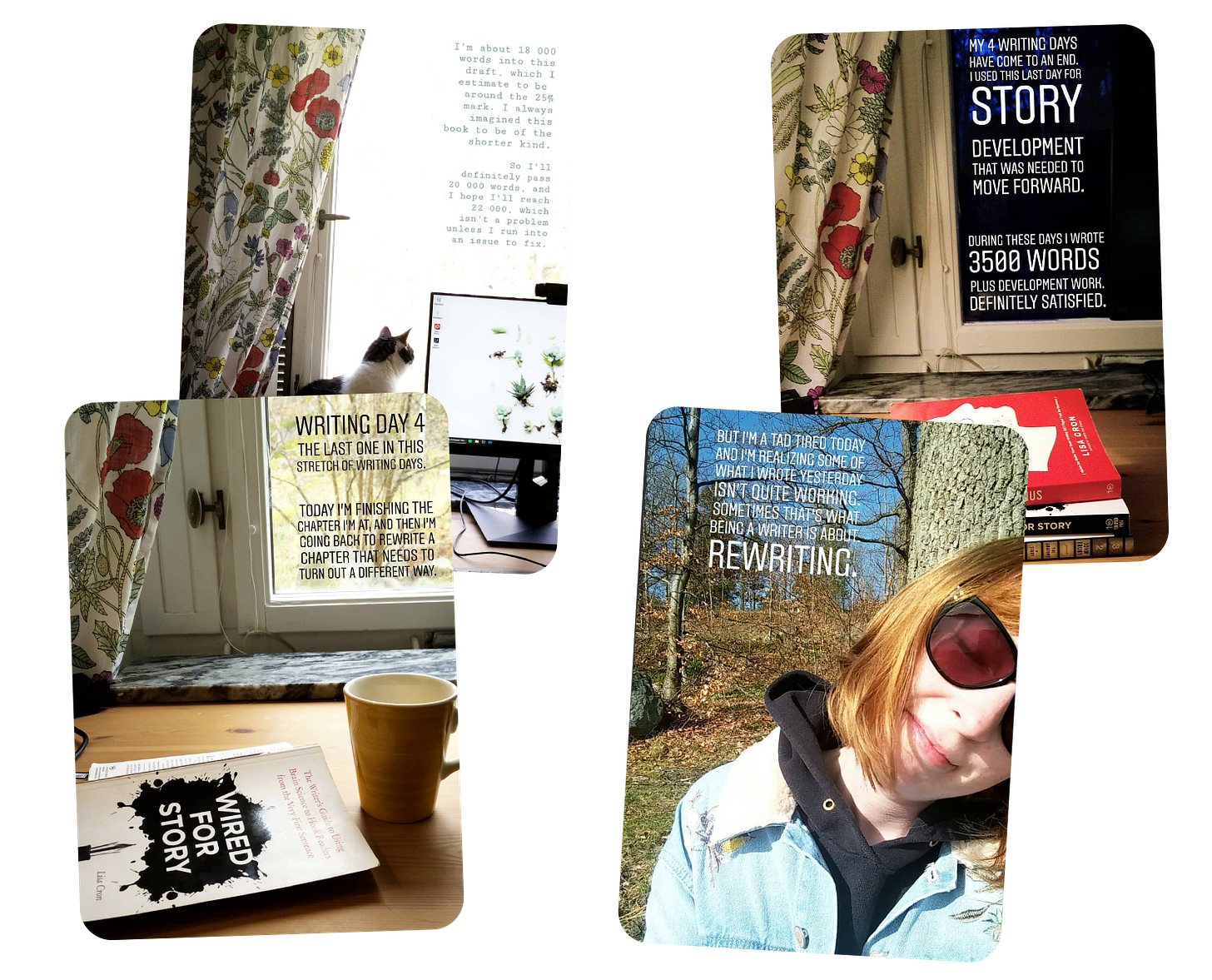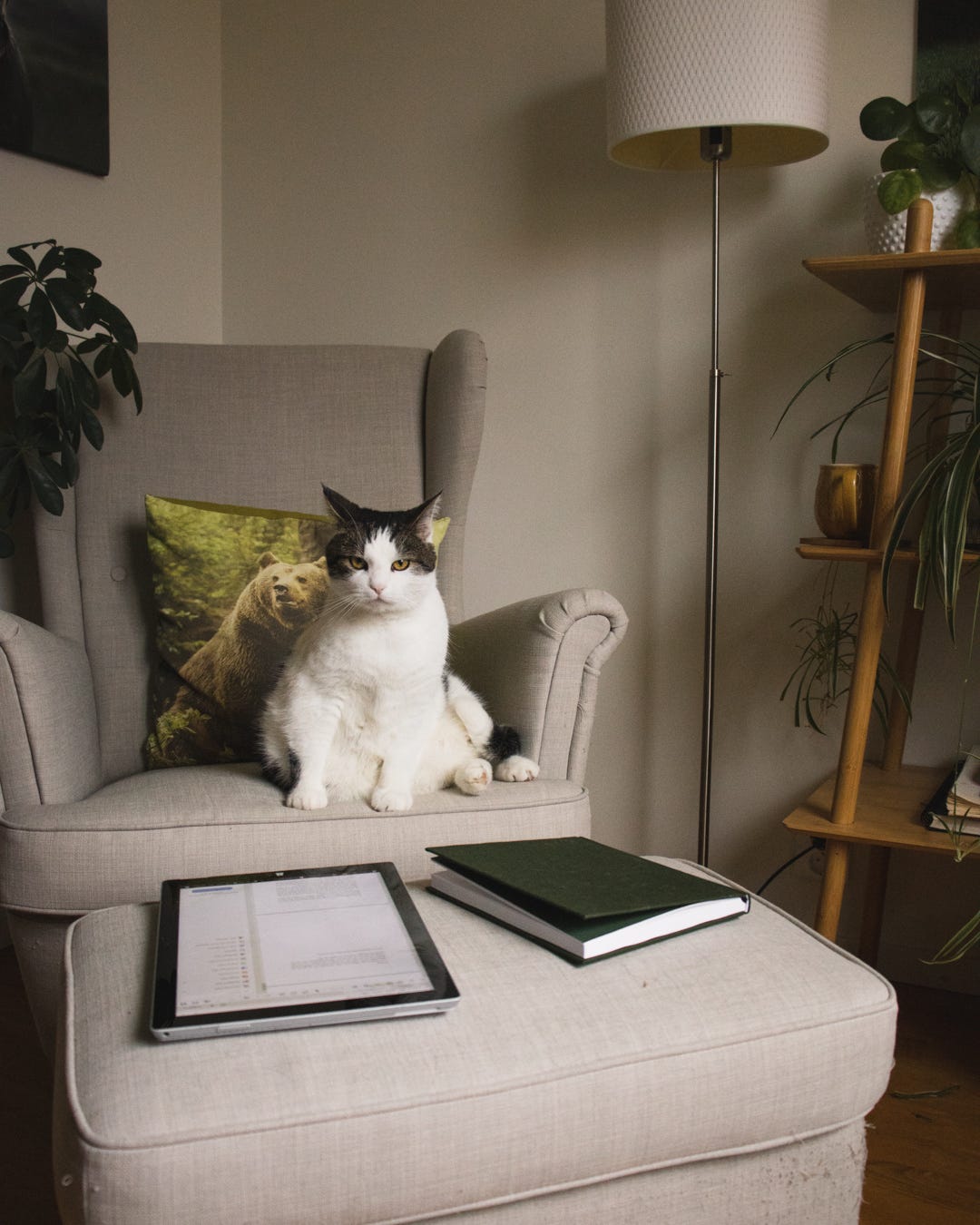Looking Back on My Fiction Writing Process Through the Years
And the lessons I'm taking with me in my next novel project
I stare out the window. The snow is sagging on the roofs, heavy and wet. I’m trying to untangle my writing process, and the more think, the more muddled it becomes in my mind.
This year, I want to work on my process of writing fiction. As a first step, I’m looking back over my years of writing. Considering at what has worked and what hasn’t. What my process has actually looked like.
So here I am, staring out the window, trying to understand. Why is writing fiction so difficult? Difficult to the level that I’m having difficulty writing about the difficulty of writing.
I sigh, frustrated, and there’s that feeling again. The resistance.
The years of fear, joy and reckless abandon
2011-2012
When I think of having fun writing fiction, I think of myself as a university student. My dream of writing novels was strong. So strong, I was terrified of writing poorly and not getting published.
I tried to start writing a novel and was overwhelmed by my inner critic. I hated everything I wrote.
Then, I found the writing challenge NaNoWriMo and wrote 50 000 words in a month. I blocked out my inner critic by not having time to evaluate what I was writing. I just wrote, wrote, wrote.
I loved it. I remember frantic afternoons of writing in my favourite writing café after lectures. I remember having a lot of fun.
The frustration came back after, when I read through what I had written and realised there were no story there. There were words, but unusable words.
Six months later, in the summer of 2012, I participated in a new NaNoWriMo challenge. I took the only chapter of my novel draft I liked and used it as a base for a new story with the same main character. Again, I wrote 50 000 words. Again, I had fun but I was unhappy with what I had written afterwards.
The years of facing fears and honing skills
2013-2017
I wrote less. I graduated from university, worked a year for a student organisation, then moved to Stockholm and started my first 9-5 job.
I tried to get back to writing and took two writing courses held by a local Swedish author. I wrote some, I learned some, but I still struggled with that inner critic.
Then, in 2016, I started blogging. I wrote about my creative fears, how I struggled to write, and I started facing those fears by publishing my words online.
In 2017, I read books on the craft of writing fiction and storytelling. I was learning some actual skills in building a story, and I used the lessons I learned to pull my latest novel draft apart and rebuild the story from the ground up.
This, again, I remember as fun. I enjoyed learning and I enjoyed planning the story.
I wrote on my blog about how my dream had been holding me back just as much as my fear of failure. How wanting to get published had made me too critical of my own writing.
I've said goodbye to my impossible standards. I've started to be kind to myself as a writer. I've accepted that my writing will be filled with flaws.
I no longer see getting traditionally published as my ultimate goal.
Today, my dream is this: I want to write novels.
And guess what? I'm living my dream. I'm writing with more ease than I have in years and years. Today, I'm starting the third draft of that book.
And now began my best writing years.
The structured writing years
2018-2019
If I went to one extreme in my NaNoWriMo years, writing fast with little thought and plan, I now went to the other extreme. I wrote detailed notes for each and every scene in the book. After months of planning and preparing, I started writing the third draft in December 2017.
It took me a year and a half to write the third draft. I wrote on average 3 800 words per month, and wrote during a total of 81 days. Yes, I tracked my writing in a spreadsheet.
I think back on this period with fondness. There were times when I was really tired of the story. But there was a determination that kept me going. I shared my writing process in Instagram stories. It was hard, but it was also fun.
Finally, in June of 2019, I finished the draft.
The editing, pitching and non-writing years
2020-2023
After finishing my third draft, I let it rest for a month, and then read through it with fresh eyes. Finally, I had a book draft that was half decent. I identified where it needed work and began an editing draft that took me about 6 months to complete.
We were now in the beginning of 2020. I started coaching creatives and focusing on building a creative business.
I let some friends read the draft, and did some more edits. In autumn of 2020, I finally sent the finished manuscript to publishers. (Agents doesn’t really exist in Sweden.)
In the spring of 2021, I had gathered rejection emails and given up on the publishers that hadn’t bothered to send a reply. I’d gotten feedback on the draft from one publisher, and pondered a new round of rewriting. But now, I went full-time with my business and didn’t have much space for novel writing.
With the start of 2022, I began pulling apart the novel structure again and plan my rewrite. I had ideas for what I wanted to fix. I began rewriting in the summer of 2022 and got about 15 000 words edited.
In 2023, progress ground to a halt and in summer, I decided to not continue the quite extensive rewrite I had began. I had lost my passion for the story.
And now, there is doubt
Darkness has fallen over the snowy roofs outside my window. My writing years are laid out before me, and I look back on them with both sadness and joy.
Joy, because I now remember the good years. I remember the fun I’ve had, writing crappy drafts, constructing a story, learning and trying. I remember the sense of accomplishment when I finished the year and a half long third draft. I remember the thrill of learning about story. I remember the optimism.
Sadness, because I now remember what I’ve lost. Ever since I got my rejections and started the unfinished rewrite, the joy has been missing. I have not felt excited about the story, not enjoyed writing. It has been a fight, a slog, and I have wondered whether I even want to write fiction anymore.
These past years, I’ve forgotten why I dream of writing novels.
Between my reading slump, lack of inspiration for my novel project, self-employment and then shift to a writing job, and frankly having a lot of fun writing everything apart from fiction, I’ve lost both my drive and confidence for writing a novel.
Despite not really expecting to get published with my first book, I think my hope took a hit. I worked so hard on that book, and yet reading it back now, I find it lacking. It makes the thought of starting a new novel project feel a little pointless. Why would I manage to write a good book this time around, if I didn’t the last?
And I definitely might not get published with my next attempt at a book. Yes, I know I can self-publish, but I won’t want to self-published a book I’m not satisfied with.
So why do it, then? Why try again?
Well, because I do remember the joy. I remember the drive to write fiction just because I enjoyed it. I just have to find it again.
My lessons for the writing years ahead
It stings to admit it, but I care less about my dream of writing books than I once did. Writing is my job and I have found happiness and ease as a writer.
But there’s a perk to caring less. It means I can be more ruthless about actually having fun and enjoying the process of writing.
Looking back on my years of writing, these are the lessons I’m taking with me as I now go looking for the joy of writing fiction again.
1. A story I’m excited to write
Draft one through three, I was passionate about the story I was telling. I did full rewrites, and I was happy. Yes, I got a bit tired of the story towards the end, but it wasn’t too bad. However, once my excitement dwindled, when I had worked on it for too many years and felt mentally done with the story, everything became harder. So the first thing I’m looking for is a story I’m excited to write. I think I might have one, but I’m trying it out before committing.
2. Test before I commit
One recurring struggle of my past novel project was the tendency to commit to an idea, a plot, a plan before I could fully determine if it was going to work or not.
In the first two drafts, I wrote without evaluating at all. In the third draft, I planned a lot before I even started writing. Things that worked in theory didn’t always work in practice. This left me with a frustrating amount of rewriting and editing.
For my next project, I want to try writing a chunk of the story and then stopping to evaluate what’s working and what isn’t. I want to test out the story before I write an entire draft that I later realise has core structural issues. The goal will be to identify problems early and tweak the story as I write it.
3. Reconnect with the joy of the craft
I haven’t read a book on the craft of fiction writing in a long time. Nor about the process of writing for that matter. There are two books in my bookshelf that has been there for years. It might be time to read them.
While I don’t want to obsess about writing perfectly, I miss the nerdy fun of learning. I want to tap back into that.
4. Have a balanced approach to quality
I can’t help it, I’m a picky reader. I struggle to enjoy books I find poorly written. So of course I care about the quality of what I write. But I need that balance I felt as I worked on the third draft of my novel - to try my best, but also accept that there will be flaws in my writing. I need to write the book I’m capable of writing, that stretches me but that is still within my reach.
I know that the more I write, the better I will become. It has been true in every other type of writing I’ve tried, and I’m convinced it’ll be the same in fiction writing. So I’ll aim for enjoying writing a flawed goodish book.
5. Find a reasonable pace
I’ve been all over the place with my writing pace, from 50 000 words in a month, to years for small amounts of editing. The more time passes, the more likely it is that I disconnect from the story, so I want to keep up some kind of pace once I start writing a story. But I also don’t want to rush the writing. Most of all, I want to feel that I’m in the story and not getting disconnected from it for long periods.
6. Embrace a hobbyist mindset
At times, I have approached fiction writing from a very serious angle. Attempting to write a good book has weighed heavily on me, increased my perfectionism and made me look at my book project with critical eyes. I’ve focused on the result, the finished story, more than the process of writing it.
But I’m not a serious, published author. This is a hobby of mine, just like this Substack, and there’s freedom in that. I can write the novel I want to write, the way I want to write it. I want to lean into that ease.
7. Balance planning and discovering
As I explore a new book idea, I’m careful to not destroy the magic of it by attempting to plan it out all at once. Having both written without planning and with a meticulous plan, I want to keep a balance between the two. Now, in the beginning, I want to discover some of the story through writing, and I want the outline to take shape as I go. When I get further, I’m going to do more detailed outlining.
8. Make the process delightful
During my most productive years of writing fiction, I focused a lot on learning how to write well. And that’s good. But I have spent little time thinking about how to make the writing process as enjoyable as it can be.
To be excited about the story is a big part of it. But there are other things as well. For example, choosing a story that is at the right level of difficulty, that plays to my strengths as a writer rather than challenge me on every level possible.
I want to build a little happy bubble for myself to step into as I work on my next project. Maybe a dedicated notebook, maybe writing at the settings of scenes, maybe playlists, maybe researching related topics. I don’t know exactly. I just want to make sure I have a lot of fun writing. And I’ll most certainly share the journey here.
















Thank you for sharing! I totally believe in focusing on enjoying the process – because as you said: then you are living your dream - you are writing novels!
I also completely understand the dream of having your book published and “out there”. I have been fortunate to have a non-fiction book published (much easier to write than fiction) but on my bucket list is also writing fiction and children’s books. But taking the time and not losing interest in the story are def big hurdles to get over. I look forward to continuing hearing about your writing journey 😍
Have you read Writing Down the Bones? I discovered it last week and I’ve nearly finished reading it. It’s more about memoir like writing, but I think the exercises can be used for fiction writing too. It’s about freeing the writer within (as it says on the cover).